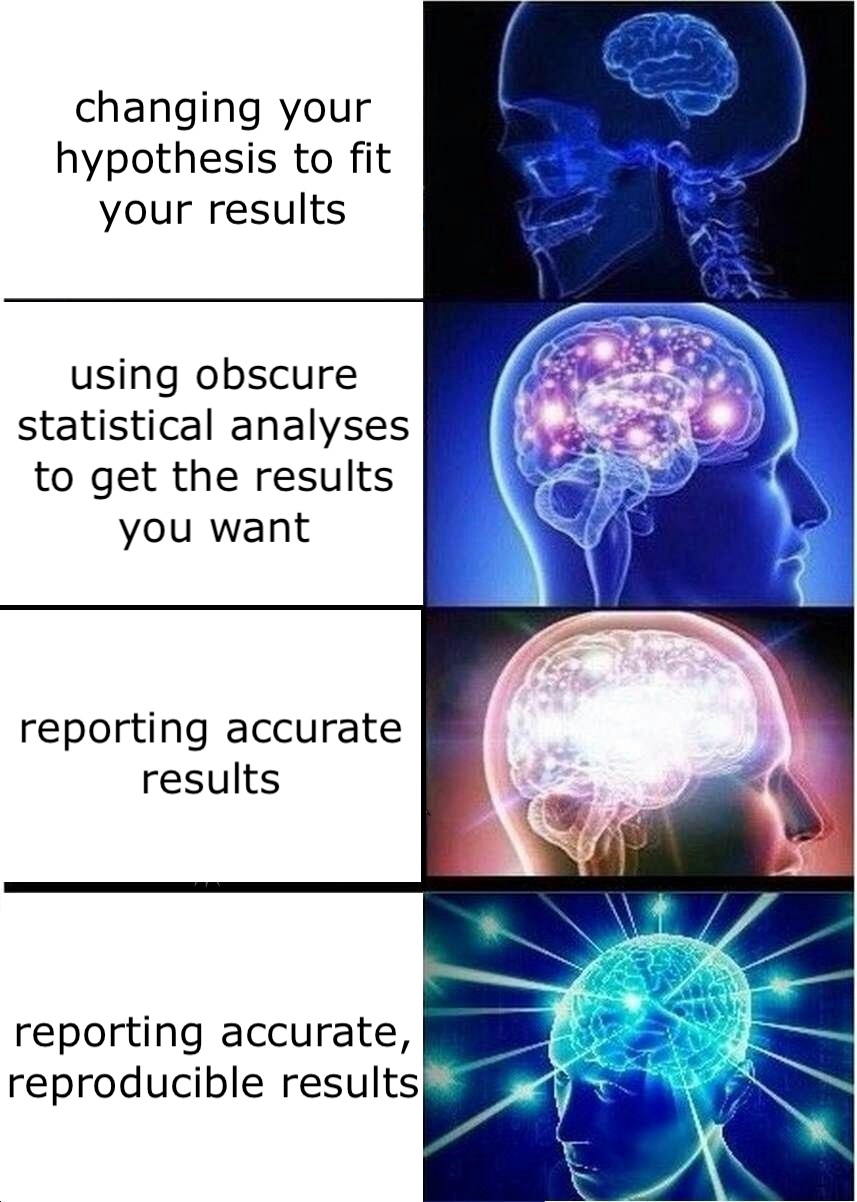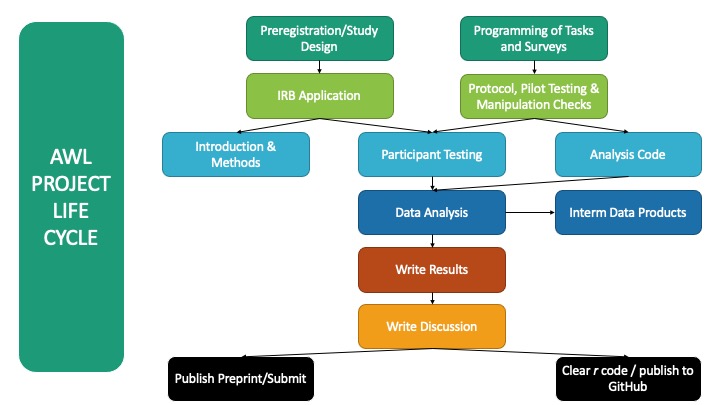Chapter 6 Scientific Integrity and Project Life Cycle
We have a resposibility to uphold the highest standards of scientific integrity. There is never an excuse for fabricating or misrepresenting data. If you have any questions or concerns about a research practice you have seen in the lab, please talk to me immediately.
6.1 Open Science
The Aging Well Lab has a commitment to open science. This means that we will share all stimuli, data, and analyses online (via OSF) and link these materials to our research publications. In order to make these materials usable to reviewers and other researchers, we will strive to do the following:
- Document and describe all items. At a minimum, each collection should have a README file at the top level that provides details about the collection.
- Code should be tested, bug-free, and well-commented.
- Links should be permanent.
Lab members creating stimuli or conducting research projects should organize them from the outset in a way that is conducive to eventual sharing (GitHub, ipython notebooks, etc.). More specific guidelines will be posted on the lab wiki (as they will likely change regularly).
6.1.1 Reproducible Research
Reproducible research is research that can be exactly reproduced - meaning that someone else can get the same results given the same set of data. At a minimum, we want our research to be reproducible.
Conducting reproducible research is more difficult than it sounds, because it requires that you are organized and possess sufficient foresight to document each step of your research process. There are two main things we will do to improve the reproducibility of our research: (1) extensive notetaking and (2) using programming workflows with version control for all research products (including data cleaning, analysis, posters, papers, etc).
Programming workflows help with reproducibility because they take some of the human element out, and in an ideal scenario, you are left with a script or series of scripts that takes data from raw form to final product. Programming alone is not enough, though, because people can easily forget which script changes they made and when. Therefore, all projects that involve programming of any kind (so basically, all projects) must use some form of version control.

As a lab, we will use git and GitHub for version control. This is a requirement because (a) it is the only way to track the evolution of methods/files over time, (b) it allows for easier detection of bugs, and (c) it facilitates code sharing. All of these things are directly relevant to conducting reproducible research. More information on GitHub can be found in the General Policies section.
6.1.2 Preregistration
Pre-registration is specifying a data collection and analysis plan before you gather data. This will allow us to distinguish between what we set out to do, or confirmatory analyses and what we discovered in the process of doing research, or exploratory analyses. See Preregistration: A Plan, Not a Prison for more information.
For each study in our lab, we will create a preregistration and repository on OSF (osf.io) using our lab’s project template. More information about OSF can be found in the General Policies section.
6.2 Ideal Project Life Cycle

This is an idealized chart showing the stages of a research project in the lab, starting with planning activities in green, research progress in blue/red, and ultimate research outcomes in black. Tasks at the same level of this hierarchy can be performed at the same time (e.g. Participant testing and drafting of Intro/Methods) while activities at different levels in this hierarchy should proceed (and sometimes MUST proceed) in sequential order, from top to bottom (e.g. Data analysis must happen before you can write a results section).
6.4 Human Subjects Research
Because we are engaged in human subjects research, it is imperative that we adhere to our approved IRB protocols. All lab members must read and comply with the IRB-approved consent form and research summary for any project that they are working on. Lab members must also complete UTD Human Subjects Training through eLearning and be added to the research personnel list before they can work with humnan subjects or data. After completing Human Subjects training, the certification of completion must be sent to the lab manager, who is responsible for maintaining these files. If there are any questions about the protocols, or if you’re not sure whether we have IRB approval to run your study, please ask the lab manager or me for clarification. If neccessary, the lab manager can file an amendment to an existing protocol or help you create a new protocol.

If you encounter any problems in the course of doing research that results in a negative outcome for the participant (e.g., if a participant becomes ill or upset, if there is an accident with the equipment, if there is a breach of confidentiality, etc), you should immediately seek assistance from me or the lab manager. If I am not around, you MUST notify me within 24 hours, preferably as soon as possible. In some cases, we may need to report this information to the IRB and/or our funding agencies.